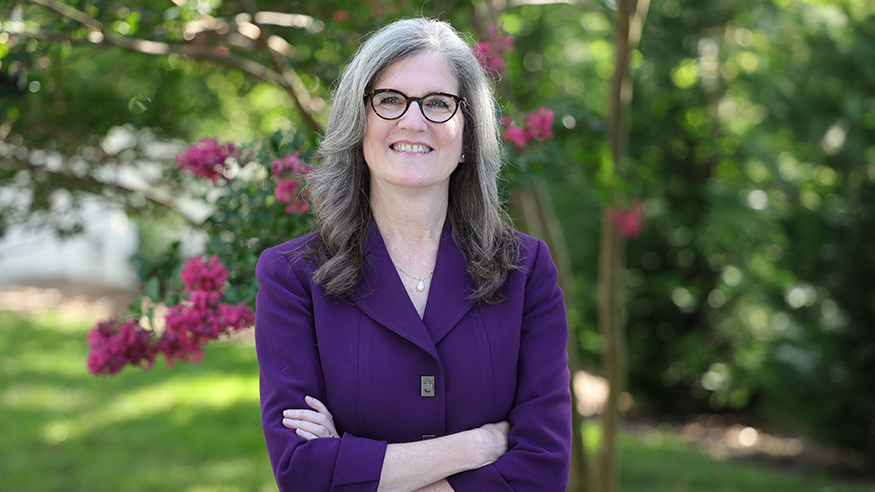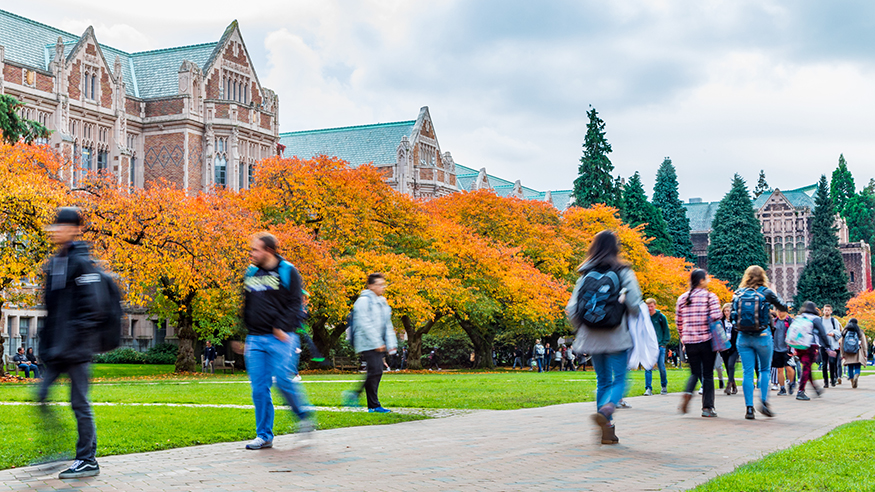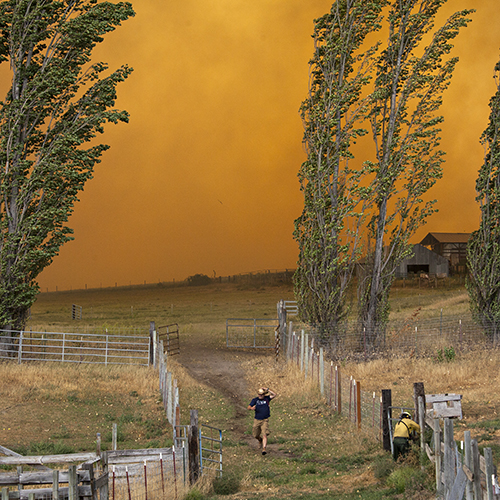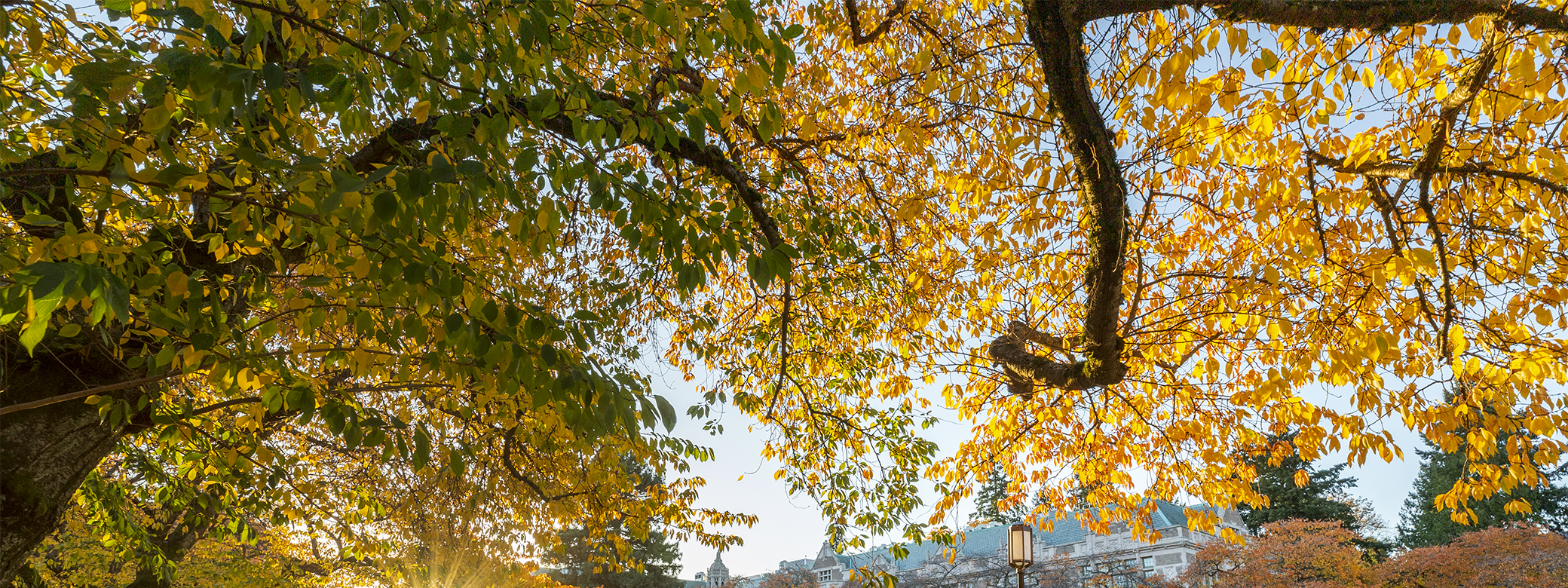
“I’m an optimist, but also a realist,” says Dianne Harris, who joined the UW College of Arts & Sciences as dean on September 1. Those qualities — and Harris’s dedication to cross-disciplinary work throughout her career — will serve her well as she leads the University’s largest and most academically diverse college.
Harris began her academic journey with a PhD in architectural history from the University of California, Berkeley. Her scholarship, which spans from 18th-century Lombardy to the postwar United States, is united by a sustained focus on the relationship between the built environment and the construction of racial and class identities.
After serving as a professor of architecture and landscape architecture at the University of Illinois at Urbana-Champaign, where she also held appointments across five additional departments and programs and led its Humanities Research Institute, Harris became dean and history professor at the University of Utah’s College of Humanities. Most recently, Harris served as a senior program officer at The Andrew W. Mellon Foundation, developing initiatives and making grants with a social justice focus in support of higher education and the humanities.
In September, as Dean Harris began her new role at the University of Washington, Perspectives editor Nancy Joseph chatted with her to learn more.
Welcome to the UW College of Arts & Sciences! What led you to pursue this leadership role?
I'm a passionate devotee of public universities and public education. I believe with all my heart in their promise and in what they offer folks from all walks of life. The University of Washington offers something that is becoming vanishingly rare in this country — a global, world-class, research-informed education at an affordable price, in an institution full of outstanding faculty, staff, and students with a commitment to serving the region, the country, and the globe. I can't think of a better way to spend my time than doing whatever I can to support and lift up the people who are making that happen.
I'm a passionate devotee of public universities and public education. I believe with all my heart in their promise and in what they offer folks from all walks of life.
You came to the UW from The Andrew W. Mellon Foundation. What inspired your shift back to academia?
Working at the Mellon Foundation was an incredible privilege. It was a rare opportunity. The foundation had always engaged in social justice-focused philanthropy, but during my time there they pivoted to entirely focusing on social justice, which was a really exciting thing to be part of. But I realized that university life is just baked into my bones. I loved being part of the many high-level conversations with leaders from across sectors in higher education and making grants in support of their innovative efforts, but I started to think, “I want to go do that work. I want to be the one with my boots on the ground, in the university, helping to support faculty, students, and staff to make the changes we need now in higher education.” I just kept feeling that tug to be on campus, to help in a very direct way. And I realized that my experience at Mellon would be very helpful if I were to return. I’m thrilled to be back in the academy and especially to be at the University of Washington.
How will your Mellon Foundation experience help you as dean?
Being there gave me an overview of higher education across sectors nationally, and even internationally, that I could just never have had anywhere else. All of us who are academics come to know the institutions we're in pretty well, and we certainly know our departments. What can be difficult is to know how other institutions really run, to know and understand the challenges they face no matter how well-resourced, and to hear about the various experiments and solutions being tried. At Mellon, I had opportunities on a daily basis to speak with university presidents, provosts, chancellors, deans, and center directors working at every kind of institution in the United States, from the most elite Ivy League schools to much more modestly resourced institutions. Beyond that, I was constantly in touch with organizations that support the higher education enterprise. It was really an extraordinary learning opportunity and gave me a very different overview and perspective.

Throughout your leadership roles, you have continued to pursue your research. Has your scholarship informed your administrative work in any way?
My scholarship has always crossed disciplinary boundaries. I'm interested in the work of scholars across many disciplines. I think that helps in a role like this. Also, I've always been interested in questions of belonging and exclusion, of the ways the built environment helps shape our sense of who we are and where we belong and where we don't belong, of how it limits life opportunities for some people and opens them up for others depending on their race, class, ethnicity, gender identities, and the intersections of those things. I’ve tried to see who wasn't in the neighborhood and who wasn't having access to housing. It trained my mind and my brain to also think about who's not in the room, who's not at the table, who's not on our faculty, where we’re not as accessible as we might be, and to question the underlying systems and structures that create and restrict access. Do I always do that successfully? No. It's an ongoing project and I think it can be easy for people like me, who are white and have had opportunities, to forget to look for who's not in the room. For me it's a constant project and a priority. And it does link my work as a scholar, teacher, and administrator.
As someone who's been focused on diversity and access for years, what opportunities do you see for change in the current moment, and how do we make that happen?

I'm a very optimistic person by nature, and my optimism makes me want to believe that we are at a moment of reckoning and transformation. But I'm also a realist, and I know that while this moment looks a certain way and feels a certain way and there are observable changes happening, there's still so much work to be done and there are very powerful counterforces at work. So we have a long way to go.
How do we make real change happen? I think it's by holding ourselves accountable. By committing resources, real resources, towards the question and the problem. By keeping it constantly at the forefront of the conversation, not just saying it's a priority. If there are no resources and there's no accountability, it's not a priority. If it's not always on the agenda, it's not a priority. I'm looking to see where the College is and where the College needs to go and what resources it would take to get there and how we'll hold ourselves accountable. It may be some time before I can answer any of those questions, but it's always on my mind. Happily, I think that many colleagues at the University of Washington feel the same way, so I'm optimistic about what we can accomplish together.
How do you see your role as dean in Arts & Sciences?
Right now it’s important for me to understand the distinctive greatness of the College of Arts and Sciences at the University of Washington — where things are already extraordinary and how we can best support faculty and students and staff. We are fortunate to have an extraordinary team of divisional deans in the college, and they are doing so much important work. They are helping to orient me, helping me to see the big picture that’s essential at the beginning of a new position like this, and in a very complicated and large college. Communicating to students, parents, and to members of the general public about our distinctiveness and about the essential and timely contributions we make and that a liberal arts education provides will be a key part of my work and something I look forward to doing in partnership with our colleagues.
I also think it's important for me to be a provocateur at times, to push and prod and ask sometimes uncomfortable questions about why we do things a certain way. Because sometimes we've done them for a long time and that's why they're that way. But sometimes they're that way for really good reason. I think it's a dean's job to ask those questions and help see what the possibilities are. And hopefully the experience that I'm bringing with me from the Mellon Foundation, seeing what’s happening across the country, can help raise some of the big issues that I know are percolating nationally.
...It's important for me to be a provocateur at times, to push and prod and ask sometimes uncomfortable questions about why we do things a certain way.
What are your top priorities for this year?
This will certainly be a year of learning. There's no other possibility, right? It’s a big, complicated, wonderful college, so it's really important to take time to listen and learn. At the same time, there are some things that require immediate attention and I’ll have to jump right in and get rolling. It’s also important to recognize that, with COVID still a concern, this is not going to be a normal year. I don't know when we'll have a normal year, or what “normal” will be, but I think it's really important for me as I come in, full of optimism and energy and excitement and ideas, to recognize that faculty, staff, and students have been through a really tough year and a half, and that the difficulties of this pandemic are not yet behind us. So it's a particularly good time to be thoughtful about when and where is the right time to make interventions or to push or to be that provocateur as opposed to being a listener and a supporter. It doesn't mean we're not going to work on some important challenges, but it does mean that I'm very aware of the ongoing challenges of this moment and incredibly grateful to everyone working so hard to make this academic year a success.
Arts & Sciences is the liberal arts core of the University. What would you say to those who question the value of a liberal arts education?
We definitely have a challenge in terms of public perception. Even the term “liberal arts” is a bit confounding to some people. But the goals of a liberal arts education are absolutely fundamental to what society most needs now. All the data show that our students do spectacularly well, because employers want the skills we're teaching our students — all the writing skills, the thinking skills, the collaboration skills, the analytical skills, the ability to synthesize across disciplines and to forge new connections, all of that. Our students are great problem-solvers, but they are also the students who know how to formulate and frame the next set of big questions and who can creatively imagine the solutions to the grand challenges we are facing as a society.
I also think we can learn a lot from students right now about how to help with responding to this question about the value of the liberal arts. For a long time, there's been a close correlation in the minds of students and parents between a major and a career. A major is not a career, and thinking of it that way shortchanges everyone. A major ideally prepares students for a wide range of career possibilities for a 21st century in which we know the nature of work will rapidly shift and evolve. I don’t believe in so-called “soft skills” and “hard skills,” but I do believe in making students ready for the complex road ahead by arming them with the most broad, rigorous, and richly developed education we can — exactly the sort that our college provides — and making sure they and we can articulate to future employers the powerful asset such an education is and can be.
You’ve described yourself as an optimist. Given the challenges of the past 18 months, what makes you optimistic right now?
Many things, actually. One of them is watching the ways the University of Washington pivoted at the start of the pandemic. Thousands of faculty members and staff members who had not been working remotely quickly switched to this new mode of working and did it quite well. Nothing happens perfectly in a crisis, but their goodwill and ingenuity and commitment to the endeavor gives me tremendous optimism. It shows what's possible when people work together to solve a problem and a crisis. It's actually quite extraordinary.
Also, one of the things I love about this particular deanship is that I step into it as part of an amazing team that my predecessor, Bob Stacey, helped create and made come alive. I’m grateful to be following such a magnificent dean. I don't know him nearly as well as many of you do, but I can see that he led with generosity, care, empathy, tremendous knowledge and skill, and a really steady hand. He made spectacular hires in the College, and that includes the leadership team. So I just feel so lucky to be following such a wise and an excellent steward and leader.
More Stories

What Students Really Think about AI
Arts & Sciences weigh in on their own use of AI and what they see as the benefits and drawbacks of AI use in undergraduate education more broadly.

10 Arts & Sciences Stories from 2025
As 2025 comes to a close, we're sharing some of the year's top Arts & Sciences stories.

A "gesture" to jump-start careers
To prepare students for professional success, the UW College of Arts and Sciences offers “gesture,” a mock startup company where student interns gain skills that employers seek.
